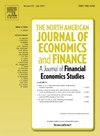Optimal venture capital entry–exit strategy with jump–diffusion risk
IF 3.8
3区 经济学
Q1 BUSINESS, FINANCE
North American Journal of Economics and Finance
Pub Date : 2025-01-01
DOI:10.1016/j.najef.2024.102359
引用次数: 0
Abstract
This paper introduces a double exponential jump–diffusion process to model the pre-expansion value of a start-up firm. Within this framework, we present a dynamic model for studying the entry and exit decisions of venture capitalists (VCs). The model returns an analytical solution for the entry trigger, a semi-analytical solution for the exit trigger, the post-money optimum ownership, the (raw) cash multiple and a new time-adjusted version. Significantly, we uncover a direct correlation between the optimal premium upon exit through the trade sale (M&A) and the start-up firm’s value during the M&A offer. Additionally, we theoretically demonstrate that the exit trigger is larger than the value of the start-up firm when the VC makes a M&A offer to the buyer. Our numerical analysis discusses the following empirical implications: (i) postponing the M&A offer results in an increased optimal premium, leading to a strategically delayed divestment. This delay corresponds to an amplified (raw) cash multiple but triggers a notable decrease in the adjusted cash multiple; (ii) considering jump risk enhances the expected investment performance; (iii) the post-money optimum ownership is not influenced by jump risk; (iv) greater uncertainty associated with jump intensity and volatility prompts delayed entry and exit decisions, producing larger cash multiples; (v) a higher VC’s optimism leads to an increased (raw) cash multiple and a decreased adjusted cash multiple.
求助全文
约1分钟内获得全文
求助全文
来源期刊
CiteScore
7.30
自引率
8.30%
发文量
168
期刊介绍:
The focus of the North-American Journal of Economics and Finance is on the economics of integration of goods, services, financial markets, at both regional and global levels with the role of economic policy in that process playing an important role. Both theoretical and empirical papers are welcome. Empirical and policy-related papers that rely on data and the experiences of countries outside North America are also welcome. Papers should offer concrete lessons about the ongoing process of globalization, or policy implications about how governments, domestic or international institutions, can improve the coordination of their activities. Empirical analysis should be capable of replication. Authors of accepted papers will be encouraged to supply data and computer programs.

 求助内容:
求助内容: 应助结果提醒方式:
应助结果提醒方式:


